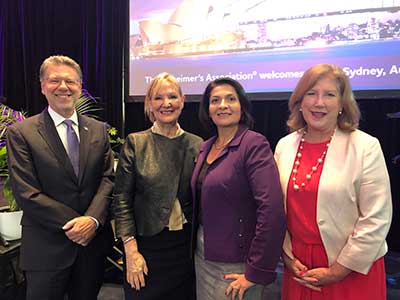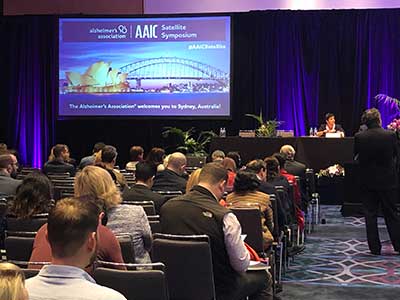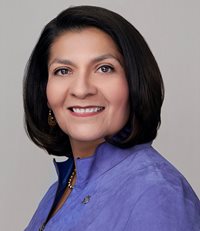As the largest, private, non-profit funder of Alzheimer’s and dementia research, the Alzheimer’s Association leads, convenes and accelerates research in order to create a world without Alzheimer’s and related dementias.
In this series, Alzheimer’s Association Chief Science Officer, Dr. Maria Carrillo, outlines why the research community is more optimistic than ever about progress in the Alzheimer's and dementia field.
Part 2: AAIC Satellite Symposium - Sharing Alzheimer’s Data in Sydney, Australia
 AAIC goes Down Under! The latest dementia science was highlighted in the Oceania region at our latest AAIC-SS in Sydney, the home of the iconic Sydney Opera House.
AAIC goes Down Under! The latest dementia science was highlighted in the Oceania region at our latest AAIC-SS in Sydney, the home of the iconic Sydney Opera House.
We gathered in Sydney (September 24-26) knowing that dementia is the second leading cause of death among all Australians and the number one cause of death for women. These staggering statistics illustrate why global collaboration is so crucial.
AAIC-SS conferences elevate awareness and inspire government action. World-leading researchers engage in dialogue about Alzheimer’s and related dementias. We share cutting-edge and innovative research, including the latest in brain imaging, biomarkers, inflammation and evidence-based approaches to care and support programs. These regional meetings take the key elements of Alzheimer’s Association International Conference (AAIC) around the globe to invigorate international collaborations in countries like Mexico, Argentina, Bulgaria, India and Brazil. And more countries will be added to this growing list in years to come.
 All of this work requires both resources and funding. In Australia, local organizations, including our AAIC Symposia partners, Dementia Australia and the NHMRC National Institute for Dementia Research, are working to support students and early career dementia researchers to get fresh ideas and perspectives in the field. In 2015, the Australian Federal Government pledged $200 million for dementia research over five years.
All of this work requires both resources and funding. In Australia, local organizations, including our AAIC Symposia partners, Dementia Australia and the NHMRC National Institute for Dementia Research, are working to support students and early career dementia researchers to get fresh ideas and perspectives in the field. In 2015, the Australian Federal Government pledged $200 million for dementia research over five years.
In 2019, the Alzheimer’s Association invested more than $42 million in 162 state-of-the-art research projects around the globe, including 13 research projects in Australia, totaling more than $2.6 million. INMune Bio, which received a $1 million Alzheimer’s Association Part the Cloud grant has clinical trials currently active in major Australian cities Sydney, Melbourne, Adelaide and Perth.
The Goals of Data Sharing
Data sharing leads us down many paths to explore, and to understand the complexities of neuroscience, we see multinational, global collaboration when it comes to lifestyle interventions to reduce dementia risk. The Alzheimer’s Association is leading U.S. POINTER, a two-year clinical trial designed to evaluate whether lifestyle interventions that simultaneously address many risk factors can reduce the risk of cognitive decline and dementia. U.S. POINTER is part of Worldwide FINGERS (WW-FINGERS), which also includes the Australian-Multidomain Approach to Reduce Dementia Risk by PrOtecting Brain Health with Lifestyle intervention (AU-ARROW) study (AUSTRALIA). To align with the WW-FINGERS initiative, the AU-ARROW research team will use the same methods used in the U.S. POINTER study.
 Partnerships that include the sharing of data are the foundations for scientific research. The Global Alzheimer’s Association Interactive Network (GAAIN) is the first integrated research platform, which links scientists, data and analytic tools across borders in order to accelerate research, knowledge and understanding. GAAIN includes data from the Australian Imaging, Biomarkers and Lifestyle study of aging — also known as AIBL (pronounced ‘ABLE’). This platform allows researchers to collaborate and share data across international borders toward the mutual goal of finding better treatments, preventions and eventually a cure.
Partnerships that include the sharing of data are the foundations for scientific research. The Global Alzheimer’s Association Interactive Network (GAAIN) is the first integrated research platform, which links scientists, data and analytic tools across borders in order to accelerate research, knowledge and understanding. GAAIN includes data from the Australian Imaging, Biomarkers and Lifestyle study of aging — also known as AIBL (pronounced ‘ABLE’). This platform allows researchers to collaborate and share data across international borders toward the mutual goal of finding better treatments, preventions and eventually a cure.
But our work won’t stop there. Alzheimer’s is a global public health crisis and demands a global solution. We must continue to convene, fund and advocate for dementia research around the globe. It doesn’t matter if the first survivor of Alzheimer’s disease is in South Africa, the Americas, Europe or in Australia, as long as it happens — and happens soon.
About the author:  As chief science officer, Maria C. Carrillo, Ph.D., sets the strategic vision for the Alzheimer’s Association global research program. Under her leadership, the Association is the world’s largest nonprofit funder of Alzheimer’s research.
As chief science officer, Maria C. Carrillo, Ph.D., sets the strategic vision for the Alzheimer’s Association global research program. Under her leadership, the Association is the world’s largest nonprofit funder of Alzheimer’s research.
Related articles:
Part 1 of this series: Alzheimer's and Dementia Research: Diversity of Therapeutic Targets
Research and Progress
AAIC-SS Sydney